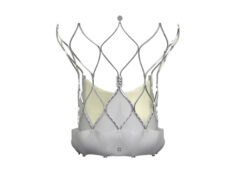
Thirty-day results of the US early feasibility study assessing the use of the Siegel (Mirus) 8Fr transcatheter aortic valve implantation (TAVI) system have been presented at the 2025 New York Valves meeting (25–27 June, New York, USA).
Investigators Pradeep Yadav (Piedmont Heart Institute, Atlanta, USA) and Raj Makkar (Cedars-Sinai, Los Angeles, USA), who also presented case studies involving the valve, reported that there was no incidence of death, stroke or rehospitalisation at 30 days in the trial. No patients had vascular complications, paravalvular leakage (PVL) greater than moderate or required a permanent pacemaker. Core lab echocardiographic data demonstrated a mean gradient of 6.3mmHg, and valve area of 2.8 cm2.
The Siegel valve includes several unique features, including its 8Fr delivery sheath; nickel free construction; lack of foreshortening and intrinsic commissural alignment; dry porcine pericardial leaflets with anti-calcification treatment and with the valve pre-mounted on the balloon.
“This is the first TAVI [system] to have no foreshortening during implantation and along with small vascular access, makes it very user friendly and should also lead to fewer pacemakers and vascular complications,” commented Yadav. “The lack of nickel is also very appealing—we were able to treat a patient with severe nickel and cobalt allergy.”
The combination of low delivery system profile and excellent haemodynamics is made feasible by the unique properties of the Rhenium alloys pioneered by Mirus including high yield strength, fatigue resistance and minimal recoil, the company said in a press release.
“The gradients and valve areas with the Siegel valve are outstanding,” stated Makkar. “Valve placement is very precise and allows us to protect the conduction system—one of our patients was quite elderly with pre-existing conduction system injury and we were able to replace his valve without having to place a permanent pacemaker.”










